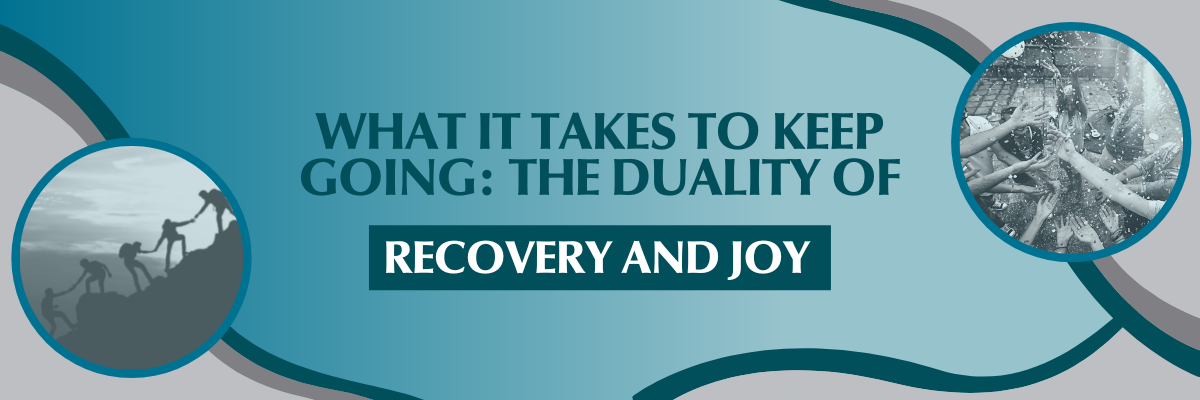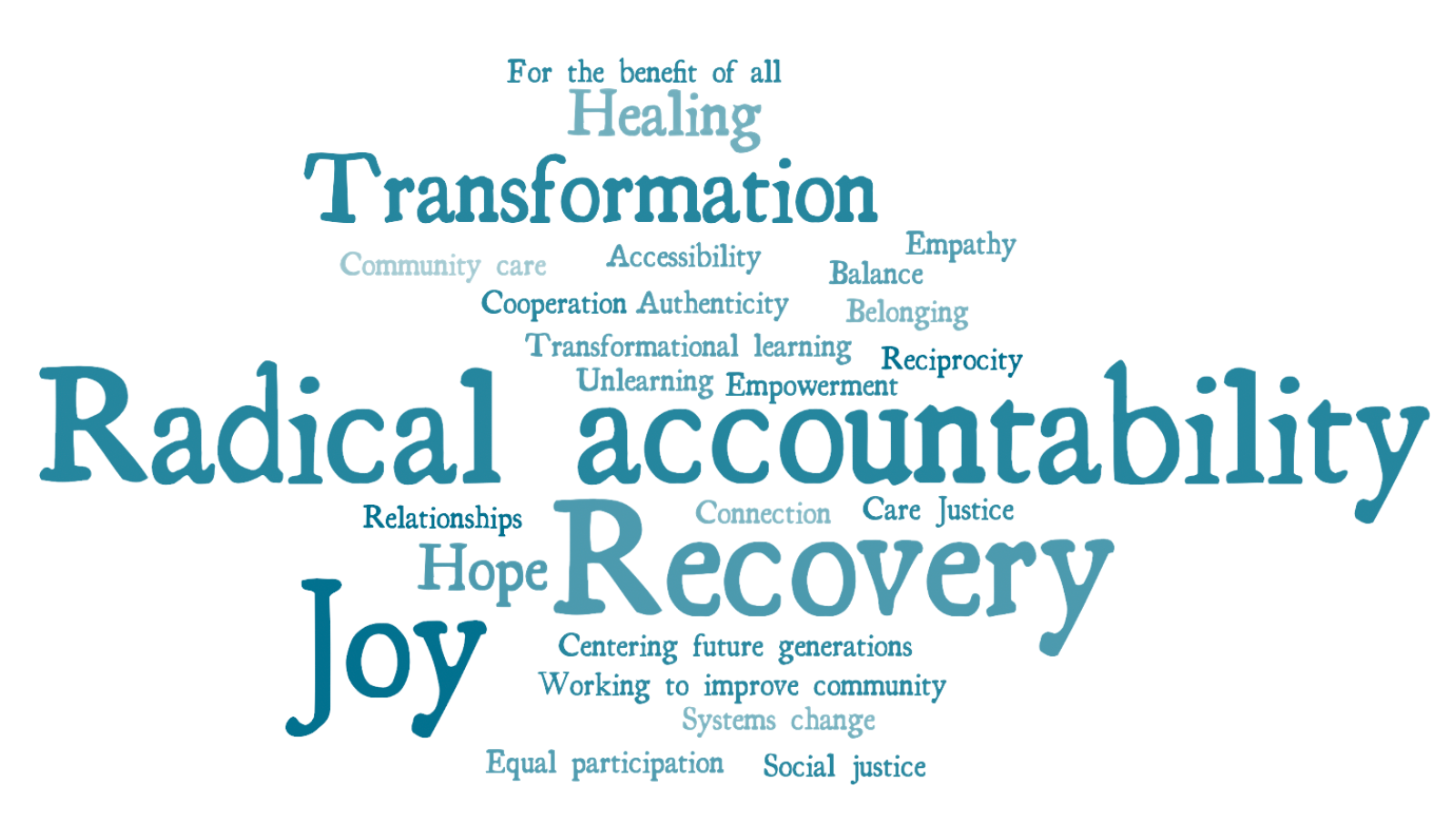
At our Annual Community Connector, Recovery and Joy: Holding the Balance we shared how the social impact sector and equity-deserving communities can prioritize joy, and both personal and community care as we continue to work towards building a more equitable, inclusive and sustainable future together.
Read on for a summary of Mojdeh Cox’s remarks addressing why we must hold both joy and recovery in these times, along with a visual representation from our attendees’ responses on what’s possible at the intersections of recovery, joy and radical accountability and what joy means to them.
CW: colonial violence, residential schools, anti-Muslim hate, and death

Image: Pillar’s Network Members reflect on what’s possible at the intersection of recovery, joy and radical accountability.
During the pandemic, we’ve heard a lot of talk about duality, holding two things to be true at the same time. We’re both tired and energized to keep going to support those most in need. We yearn for the regularity of the past to a degree, yet hope for a better future where no one is left behind. To keep going, we need to be able to hold both the sadness and struggle of recovery and the hope and meaning that authentic joy can bring us.
This discussion of the balance between recovery and joy must start with naming what we’re working towards when we speak about recovery. For many who work across the community sector, we’re no stranger to the truth that COVID has exposed the gaps in our systems that fail to support historically marginalized communities.
To meet these growing basic needs in our community, many non-profits continue to be asked to do more with less resources, leaving some folks understandably burnt out. Collectively, we’re all struggling with our health and wellness to varying degrees based on our own social location, experiences and privilege.
It’s clear that throughout this difficult time, some of us have had heavier loads to bear. May and June of 2021 were harrowing months for all of Canada, but particularly Indigenous and Muslim people.
In May, what Indigenous communities had been saying for years came into the news when 215 children were recovered on the site of the former Kamloops Indian Residential School. Since then, reports indicate this number may be 6,500 or even more across the country, and the searches for unmarked graves continue.
In June, we learned the tragic news of the terrorist attack against the Afzaal family in this city. This experience was yet another reckoning for what Muslim folks, and other equity-seeking groups in London, have known to be true for a long time, there are deep roots of racism in this city.
This is not to paint the city with broad strokes, or to deny the progress that has been made towards justice, equity and inclusion, but to acknowledge the reality that there is still much work to be done towards making London more safe, welcoming, fair and just for all.
These are just two examples of the challenges that people in the community have faced in the past year, we know there are more. These occurrences highlight the need for us to address the social issues of our time from a systems level that roots out the racist and oppressive structures imposed by colonialism and white supremacy in this country.
Regardless of your position to these issues, we all have the potential, and the responsibility, to understand how all oppression is interconnected. We need to be radically accountable to each other, and be able to justify our own thoughts, rationale, behaviour, actions and see how we may be contributing to the problem.
While we continue to take up our respective personal and professional roles in community recovery, we must make room for joy to help us find meaning and propel us forward. Finding your joy may be solitary or found in community. You may delight in making art, gardening, or cooking for your family, joining a dance class, participating in a cultural ritual or practicing your faith.
These may seem like simple actions, but in challenging times, we need to cling to these rituals to ensure we have the strength to continue the work and give us the hope and energy to drive change that is needed.
According to author and designer, Ingrid Fetell Lee who writes on the aesthetics of joy, and was influenced by icons like Audre Lorde, joy has the power to sustain activism and is the blueprint for inspiring change.
Fetell Lee explains that joy has the power to motivate us, to unify all people through common experiences, reaffirm humanity in the face of oppression, disrupt expectations, promote resilience and give us hope.

Image: What joy means to Pillar’s Network Members.
While joy is vital for us all collectively, for equity-deserving communities, embracing joy can be seen as a form of resistance and of rest.
As writer, speaker and producer, Austin Channing Brown explains in her article Joy as Resistance, it was the poet Toi Derricotte who revolutionized Black feminism with one line in a poem, “joy is an act of resistance.” With that line, Austin explains that Toi gave Black women an opportunity to rethink the work of racial justice to include holding space for what brings joy, and not just protesting, volunteering or working.
For all racialized groups, boldly practicing joy can be seen as radical when simply just being can be difficult within a white supremacist society that seeks to marginalize, other and oppress.
Equity-deserving groups need to have the opportunity to experience and share their joy to create a holistic narrative of their cultures and experiences that aren't defined through the lens of white supremacy, focused narrowly on stories about slavery and colonialism.
For BIPOC communities, embracing joy helps to rewrite inclusive historical and cultural narratives that capture the full spectrum of human emotions and experiences, not just narratives that center whiteness.
The stories we tell and believe are critical to how we all perceive the world. How can we hope to change things if our understanding of history and culture doesn’t include the experiences of all people?
Historically marginalized community groups, identities and cultures have a lot to teach the dominant culture about expressing joy. Cultural practices around collective gathering, dancing, singing, drumming, celebrating, artistic expression, etc. contribute to healthy levels of wellness, connection and resistance.
Imagine the impact of the experience of systemic oppression felt because of your identity - imagine living in a society rooted in white supremacy where consciously and unconsciously, you are held as less than - and yet still you rise through the expression and experience of joy. That, is radical.
We have to remind ourselves that many things can be true at once. Our experience in the world we know today can be both devastating and beautiful. Finding our moments of joy can bring the balance we need in order to feel whole, to live fully, to participate with energy in systems change.
If joy has the power to propel us forward, to unify us, to affirm identities; if joy is in the ties that bind us, then joy is an essential component of our social recovery.
